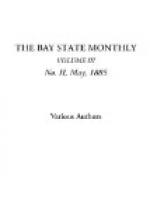“I don’t know how it came there,” she answered, leading away from the rest of the question by adding, “I have never asked a word about it.”
“Elizabeth! you are odd, that’s certain. And if Mr. Archdale is never coming here any more, you will never have a chance now to ask him. It’s a pity to be so diffident.”
Elizabeth smiled a little. “What else did you hear this morning?” she asked.
“Nothing that will interest you, though of course I thought it would when I heard it. Stephen Archdale has come back from his expedition up to the Penobscots with Colonel Pepperell. I wonder how they succeeded?”
“I can tell you that. The Indians have sent word that they will not fight against their brothers of St. John’s and New Brunswick. That means that they’ll fight for them. We shall have an Indian war with the French one. Think of the horrors of it.” She shuddered as she spoke.
“Yes,” returned Mrs. Eveleigh, with calm acquiescence. “It will be dreadful for the people that live in the little villages and in the open country.”
This calmness, as if one were gazing from an impregnable fortress upon the tortures and deaths of others, silenced Elizabeth. She looked the speaker over slowly and turned away.
“Any more news?” asked Mrs. Eveleigh in a cheerful tone.
“I can tell you nothing more,” returned Elizabeth.
This was literally true. It would not have been true if she had said that she had heard nothing else, for she had been sitting with her father for an hour, and had learned of a secret scheme,—a scheme so daring that the very idea of it made her eyes kindle and her breath come quickly,—a scheme that if it should fail would be hooted at as the dream of vain-glorious madmen, and if it should succeed, would be called a stroke of genius—magnificent. It interested her to know that among the most eager to carry out the scheme was Major Vaughn, the man whose valor she had asserted to Sir Temple Dacre a few months before. A small band of men had pledged themselves to put reality into this dream of grand achievement. “Its failure means,” thought Elizabeth, “that America is to be French and Jesuit; its success that Englishmen, and liberty of mind and conscience, rule here.” She prayed and hoped for success, and took an eager interest in all the details of the scheme that had reached her; but these were meagre enough, for, as yet, it was only outlined; the main thing was that it was resolved upon. The prisoners captured at Canso had been at last exchanged. They had been brought to Boston, and had given valuable information about the place of their captivity, the stronghold of France in America. Governor Shirley had declared that Louisburg was to be captured, and that Colonel Pepperell was the man to do it. Elizabeth, as she looked across at Mrs. Eveleigh, wondered what she would say to the project. But she wondered in silence, not only because silence had been enjoined, but because this was not a woman to trust with the making of great events. She had heard of an Indian war, and her chief thought had been that she would be safe.




